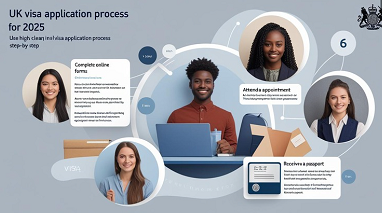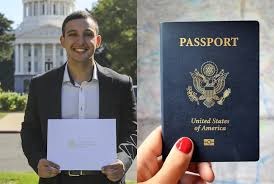UK visa application process step by step 2025
Introduction
Applying for a UK visa in 2025 can feel complex different visa routes, online forms, biometrics, document uploads, fees, and timelines. This step-by-step guide breaks everything down into clear, practical actions you can follow from start to finish. It is written for Nigerians, other Africans, and global applicants seeking study, work, visiting, or family routes to the United Kingdom. You’ll find detailed requirements, a smart document checklist for each visa type, how to prepare for biometrics at application centers in Nigeria, how to avoid refusals, typical costs you should plan for, and what to expect after your decision. The focus is on clarity, compliance, and real-world tips that help your application succeed the first time—while remaining AdSense-friendly, professional, and fully optimized for search.
Understanding the UK Visa System in 2025
The UK immigration framework offers multiple visa routes grouped broadly into:
-
Visitor visas (short stays for tourism, family visits, business meetings, or short courses).
-
Study visas (for students with an offer from a licensed UK education provider).
-
Work visas (for sponsored jobs, health & care roles, global talent, and other categories).
-
Family visas (joining a partner, parent, or child who is a British citizen or settled person).
-
Shortage occupation or health & care pathways (where applicable under current rules).
-
Other routes (youth mobility where eligible nationality applies, graduate route for eligible UK graduates, etc.).
Every route has three core pillars:
-
Eligibility (you must qualify for the route you choose).
-
Evidence (you must prove every claim with documents).
-
Process (you must follow the UKVI sequence exactly: apply online, pay fees, book biometrics, submit documents, wait for a decision, travel).
UK visa application process step by step 2025
Benefits and Opportunities of a UK Visa
-
World-class education and research for students.
-
Strong job market for eligible sponsored workers.
-
Business environment for investors and entrepreneurs under applicable routes.
-
Family reunification under family visas.
-
Global mobility—the UK is a gateway for professional and academic networks.
-
Pathways to settlement on certain long-term routes after meeting residence rules.
The UK Visa Application Process (2025): Step by Step
Step 1: Choose the Correct Visa Route
Match your purpose to the visa:
-
Visitor: tourism, visiting family/friends, business meetings, conferences, short courses (always check course length rules).
-
Student: you have a Confirmation of Acceptance for Studies (CAS) from a licensed UK institution and meet financial and English requirements.
-
Skilled Worker / Health & Care: you have a formal Certificate of Sponsorship (CoS) from a licensed UK employer.
-
Family: you are joining a partner, parent, or child who is British or settled, or applying as a parent of a child in the UK.
-
Other routes: depending on your profile (global talent, start-up/innovator successor routes, graduate route for eligible UK graduates, etc.).
Tip: If your goals overlap (e.g., study and part-time work), select the route that legally permits your main activity and the permissible secondary activity (for students, limited work is allowed under specific rules).
Step 2: Create Your Online Account and Start the Application
-
Complete the official online application form for your chosen route.
-
Answer truthfully and consistently with your documents.
-
Use names, dates, and travel histories exactly as shown on your passport.
-
Save your application often; you can return to complete and edit before submission.
Pro tip: Keep a master list of dates (travel, employment, education) so every field you enter aligns with the evidence you will provide.
Step 3: Prepare Your Documents (General and Route-Specific)
You will upload documents electronically and/or bring them to your biometrics appointment. Prepare both PDF scans and paper originals.
Universal documents most applicants need:
-
International passport (valid well beyond your intended travel date).
-
Passport-sized photographs (if required under current instructions).
-
Completed online form and payment confirmations (visa fee, healthcare surcharge where applicable).
-
Proof of funds or financial support (where required).
-
Evidence of purpose (invitation, CAS, CoS, acceptance letters, itinerary, etc.).
-
Travel history and previous visas (if applicable).
-
Tuberculosis (TB) test certificate from an approved clinic (for eligible nationalities, including Nigeria, when required).
-
Police clearance (only if your route requires it).
-
English language evidence where applicable (approved test or academic exemption).
Document format tips:
-
Use clear color scans, one document per PDF where possible.
-
Label files logically (e.g., “Passport.pdf,” “BankStatements_Jan-Jun2025.pdf”).
-
Ensure names and dates match across documents.
UK visa application process step by step 2025
Step 4: Pay Your Fees
Depending on your route, you will pay:
-
Visa application fee (varies by route and duration).
-
Immigration Health Surcharge (IHS) for routes that include access to the UK’s National Health Service (students, skilled workers, many family routes). The surcharge is calculated per year of the visa and is paid upfront for the whole period.
-
Optional priority or super priority service fees (if you want faster decisions and if the service is available in your location at the time).
Budget smart: Convert fees to local currency and add contingency for exchange rate fluctuations, biometrics service charges, premium lounge options, courier returns, and document scanning support.
Step 5: Book Your Biometrics Appointment
-
After payment, you’ll book biometrics (fingerprints and photo) at an approved visa application center.
-
In Nigeria, these centers are typically in major cities. Appointment availability can fluctuate; book early, especially during peak seasons (summer and autumn).
-
Choose standard or premium services (where available) depending on convenience and urgency.
On the day:
-
Arrive early with your appointment confirmation, passport, and supporting documents as instructed.
-
Dress neatly and bring a printed checklist to ensure nothing is missed.
Step 6: Upload or Submit Your Documents
There are two common methods:
-
Self-upload through your account before your appointment; then bring originals if required.
-
Center-assisted upload where staff scan your documents for a fee.
Best practice: Upload everything yourself beforehand and bring a USB backup or printed copies. Keep a complete set of duplicates for your records.
Step 7: Attend Biometrics and Complete Any Additional Steps
-
Provide fingerprints and a digital photo.
-
You may be asked basic verification questions.
-
If additional documents are requested later (called Further Evidence), respond quickly and clearly.
Step 8: Wait for a Decision
-
Standard processing times vary by route and season.
-
Priority and super priority services, when available, can significantly shorten wait times.
-
Track your application status online and via email or SMS updates if you opted in.
Avoid delays: Ensure the contact details you provided are active, and check spam folders regularly.
Step 9: Decision, Passport Return, and Next Steps
-
If approved, you will typically receive a visa vignette (sticker) in your passport for entry to the UK, plus instructions on your residence permission.
-
For longer-term routes, follow the instructions given for activating your status on arrival (for example, collecting a card if applicable or setting up your digital record under current arrangements).
-
If refused, you may have options such as administrative review or reapplication—use the refusal letter to correct issues and only reapply when your case is stronger.
Route-Specific Requirements and Checklists (2025)
A) Visitor Visa (Tourism, Family Visits, Short Business)
Purpose: Tourism, visiting family/friends, attending conferences/meetings, short courses within permitted limits.
Typical evidence:
-
Valid passport.
-
Proof of ties to home country (employment letter, school letter, business registration, family obligations).
-
Bank statements showing sufficient funds for the trip.
-
Travel itinerary, hotel bookings, or host invitation letter with address and relationship.
-
If invited: copy of host’s status in the UK and evidence they can accommodate you.
-
TB test (if required for your nationality and visit length under current rules).
Success tips: -
Demonstrate a credible reason to return home (employment, family, property, studies).
-
Keep your itinerary realistic and your budget proportional to the trip.
UK visa application process step by step 2025
B) Student Visa (University, College, Approved Providers)
Purpose: Full-time study at a licensed UK education provider.
Core evidence:
-
CAS (Confirmation of Acceptance for Studies) from a licensed institution.
-
Tuition payment evidence (deposit or full fees as appropriate).
-
Proof of funds that meet the set monthly living costs for the location of study and remaining tuition—held in an acceptable account for the required duration before application.
-
Academic certificates and transcripts used to obtain your CAS.
-
English language proof (approved test or academic exemption as permitted).
-
TB test (where applicable).
-
Parental consent and birth certificate if under 18.
Statement of Purpose (SOP) hints: -
Explain why this course, why this university, and how it fits your career plan in Nigeria or your home country.
-
Show genuine student intent; avoid generic answers.
C) Skilled Worker / Health & Care Worker
Purpose: Sponsored employment in an eligible role with a licensed UK employer.
Core evidence:
-
Certificate of Sponsorship (CoS) with the correct details (role, salary, SOC code, start date).
-
Passport and travel history.
-
Proof of English (as required).
-
TB test (where applicable).
-
Police certificate (if requested for specific roles or countries of residence).
-
Proof of funds (if your sponsor does not certify maintenance).
Critical checks: -
Your job’s skill level and salary must meet current thresholds for your route and code.
-
The CoS details must exactly match your application.
D) Family Route (Spouse/Partner/Parent/Child)
Purpose: Join your partner, child, or parent who is British or settled.
Core evidence:
-
Proof of genuine and subsisting relationship (marriage certificate, photos, chats, joint financial responsibility, cohabitation evidence where applicable).
-
Financial requirement (income or savings) depending on route and current rules.
-
Accommodation details showing you will have suitable housing without recourse to public funds.
-
English language requirement for partners when applicable.
-
TB test (where applicable).
Relationship evidence tips: -
Provide consistent, time-stamped evidence from multiple sources (tenancy, bills, joint accounts, travel tickets).
-
Keep explanations simple and consistent with dates and places.
Costs and Financial Planning (What to Expect in 2025)
Costs vary by route and can change. Plan for:
-
Visa application fee (differs for visitor, student, skilled worker, and family).
-
Immigration Health Surcharge (IHS) for most long-term visas: calculated per year of the visa—students and children often have a reduced rate relative to general adult rates.
-
Biometrics/service center charges (standard or premium).
-
Optional priority/super priority decision services (when available).
-
TB test fee (if required).
-
Police certificate (if requested).
-
Translations for any document not in English.
-
Courier or premium lounge fees where chosen.
-
Travel costs to and from the visa center and to the UK after approval.
Budgeting approach:
-
Build a cost table for your case (visa fee + IHS + biometrics + documents + contingency).
-
Maintain a stable balance in your bank account—especially for student and family routes with defined maintenance rules.
Timelines and Processing (2025 Realities)
-
Visitors: typically several weeks under standard service.
-
Students: aim to apply well ahead of the course start date indicated on your CAS.
-
Skilled worker / health & care: timelines vary; priority options may be available.
-
Family: can take longer; build this into your planning.
Peak seasons (May–October) may slow down appointments and decisions. Book early, and only pay for priority services you genuinely need.
UK visa application process step by step 2025
How to Avoid Refusals: Insider Compliance Checklist
-
Eligibility fit: Choose the right route for your true purpose.
-
Document quality: Clear scans, properly labeled, up-to-date, and consistent.
-
Financial evidence: Meets the route’s rules in the correct account type and for the required period.
-
Truth and consistency: Names, dates, job history, education, and addresses must match across your form and evidence.
-
SOP/cover letter: For students and certain complex cases, explain your story and intentions clearly.
-
Ties to home country (visitor): Show your obligations and reasons to return.
-
Respond quickly to additional evidence requests: Missed deadlines can lead to refusals.
-
No contradictory submissions: Do not include documents that undermine your case (e.g., a resignation letter when you claim you will return to your job after visiting).
Smart Document Strategy by Visa Type (At-a-Glance)
Visitor:
-
Invitation letter or hotel bookings + itinerary
-
Bank statements and employment letter/business registration
-
Evidence of family ties and assets
-
Travel history and previous visas
Student:
-
CAS + tuition receipts
-
Proof of funds at the required level and retention period
-
Academic records + English test (if required)
-
TB test certificate (if applicable)
-
SOP that shows genuine intent and future plans
Skilled Worker / Health & Care:
-
CoS with matching role and salary
-
Employer letter, contract where applicable
-
English test (if required)
-
Proof of funds (if maintenance not certified by sponsor)
-
TB test (where applicable)
Family:
-
Marriage/relationship evidence over time
-
Financial and accommodation evidence
-
English requirement (partners, where applicable)
-
Birth certificates (children), legal custody where necessary
-
TB test (where applicable)
Biometrics Day: What Really Happens
-
Security check and registration at the visa center.
-
Document verification (if using staff-assisted scanning).
-
Biometrics capture (fingerprints and photo).
-
Service add-ons (courier return, SMS updates, premium lounge) if you choose them.
-
Return of originals (depending on process used).
Your passport will generally stay with the center until a decision is made unless a process allowing retention applies at the time.
UK visa application process step by step 2025
After Approval: Entry, Status Activation, and Next Steps
-
Check your visa vignette for accuracy (name, dates, route).
-
Travel within the validity window on the vignette.
-
Follow the instructions provided to finalize your status after arrival (for example, activating a digital status or collecting any physical document if applicable under the current system).
-
Register with your university or employer promptly, open a bank account, and settle accommodation as planned.
-
Keep your status details safe; you may need to share proof of your right to work or study with your institution or employer.
Life in the UK: Study, Work, and Compliance
-
Students: Work only within allowed hours and conditions; maintain attendance and academic progress.
-
Workers: Work for the sponsoring employer in the sponsored role; report job changes using the correct process.
-
Family route holders: Comply with conditions, renew on time, and keep financial/relationship evidence for extensions and settlement.
-
Everyone: Update the authorities if you change address, passport, or personal details, and keep records for future applications (extensions or settlement).
Common Challenges and Practical Solutions
Challenge 1: Insufficient proof of funds (students/family).
-
Solution: Use the correct account type, hold funds for the required period, and submit statements that show consistent balances. If a sponsor funds you, include their bank statements and a clear legal link to you, plus any required consent.
Challenge 2: Weak ties for visitor visa.
-
Solution: Present strong evidence of employment/business, family obligations, property, and a realistic itinerary supported by your budget.
Challenge 3: Inconsistent information across documents.
-
Solution: Cross-check all names, dates, addresses, employment periods, and travel history. Correct mistakes before submission.
Challenge 4: Late applications in peak season.
-
Solution: Apply months in advance when possible. Consider priority options only if you genuinely need them.
Challenge 5: Refusal due to unclear purpose.
-
Solution: Add a concise cover letter or SOP explaining your purpose, funding, and return or long-term plan (depending on route).
Advanced Tips for Nigerians and African Applicants
-
TB test early: Appointments can be busy; do your TB test well before you submit.
-
Proof of funds strategy: Keep balances stable; avoid sudden large deposits without legitimate documentation.
-
Employer engagement (work routes): Ensure your employer understands sponsorship obligations and provides accurate CoS details.
-
University liaison (students): Use your admissions or international office; they can clarify CAS notes, fees, and registration timelines.
-
Keep originals and certified copies: If a decision maker requests verification, you can respond fast.
-
Professional tone: In all communications and letters, be clear, concise, and factual.
Sample Cover Letter Outline (Adapt for Any Route)
-
Header: Name, passport number, contact details.
-
Purpose: State visa type and reason for travel.
-
Background: Occupation/study status, ties to home country.
-
Funding: Who pays, amounts available, supporting documents list.
-
Itinerary/Plan: Dates, activities, accommodation, contacts.
-
Compliance: Prior travel history, respect for immigration laws, return plans or lawful long-term intent as per route.
-
Attachments: Bullet list of documents included.
Keep the letter one to two pages, formal, and consistent with your form.
UK visa application process step by step 2025
Testimonials
Amina, Abuja (Student Route):
“I started my student application four months before my course. I got my CAS, paid part of my tuition, held my maintenance funds for the required period, and submitted a clear SOP. My visa was approved without further evidence requests, and I arrived in time for orientation.”
Chinedu, Lagos (Skilled Worker):
“My UK employer issued a Certificate of Sponsorship with the correct role and salary. I included my English language evidence and TB certificate, and my sponsor certified maintenance. I paid for priority because of my start date. The decision came fast, and I resumed work on schedule.”
Fatima, Kano (Visitor):
“I visited my sister in Manchester. I showed strong ties—my job letter, approved leave, and property documents—plus a realistic itinerary and bank statements. The application was straightforward, and I returned home as planned.”
Samuel & Ada, Port Harcourt (Family Route):
“We applied as a married couple, submitting relationship evidence from our wedding to recent joint bills. We met the accommodation and financial rules and prepared a clean document pack. The process took time, but we were approved and reunited in the UK.”
Frequently Asked Questions (FAQs)
1) How early should I apply for a UK visa in 2025?
Apply as early as possible—students should target several months before course start; visitors should avoid peak surges; workers should apply as soon as the CoS is ready.
2) Do I need an agent to apply?
No. Many applicants successfully apply themselves by following official guidance. If you use a representative, ensure they are qualified and that you review every document submitted in your name.
3) What is the Immigration Health Surcharge (IHS)?
A mandatory payment for most long-term routes that grants access to the National Health Service during your stay. It is paid upfront for each year of your visa.
4) Can I work on a visitor visa?
No. Visitor visas prohibit work in the UK. Business meeting permissions are limited—always review permitted activities for visitors.
5) How do I prove funds for a student visa?
Show tuition plus set monthly living costs for the study location, held for the required period in an acceptable account. Your CAS and university guidance help you calculate the exact figure.
6) What happens if my visa is refused?
You may request an administrative review (if eligible) or reapply with stronger evidence. Address every reason listed in the refusal letter before taking your next step.
7) Can I switch visas inside the UK?
Some routes allow switching from within the UK, but rules are strict. Ensure you are eligible to switch before your current visa expires.
8) Do I need an English test for work or family routes?
Certain work and partner routes require approved English language evidence unless an exemption applies. Check the rule for your route and level.
9) How long does a priority decision take?
When available, priority typically aims for a faster turnaround than standard. Availability and timelines can change—only purchase it if you genuinely need an expedited decision.
10) Will I receive a physical card or a digital status?
Follow the instructions in your decision email/letter. The UK has been expanding digital immigration status; your route will specify how to access or activate your status.
Conclusion
The UK visa application process in 2025 becomes simple when you follow a methodical plan: choose the right visa for your purpose, prepare precise documents, pay the correct fees, book biometrics early, and tell a consistent, credible story through your evidence. Whether you are a Nigerian student with a CAS, a sponsored health worker with a CoS, a spouse joining a partner, or a visitor planning a short trip, this guide provides a clear roadmap from application to arrival.
Stay organized, double-check everything, and apply early. With the right preparation, your UK visa journey can be smooth, compliant, and successful.





